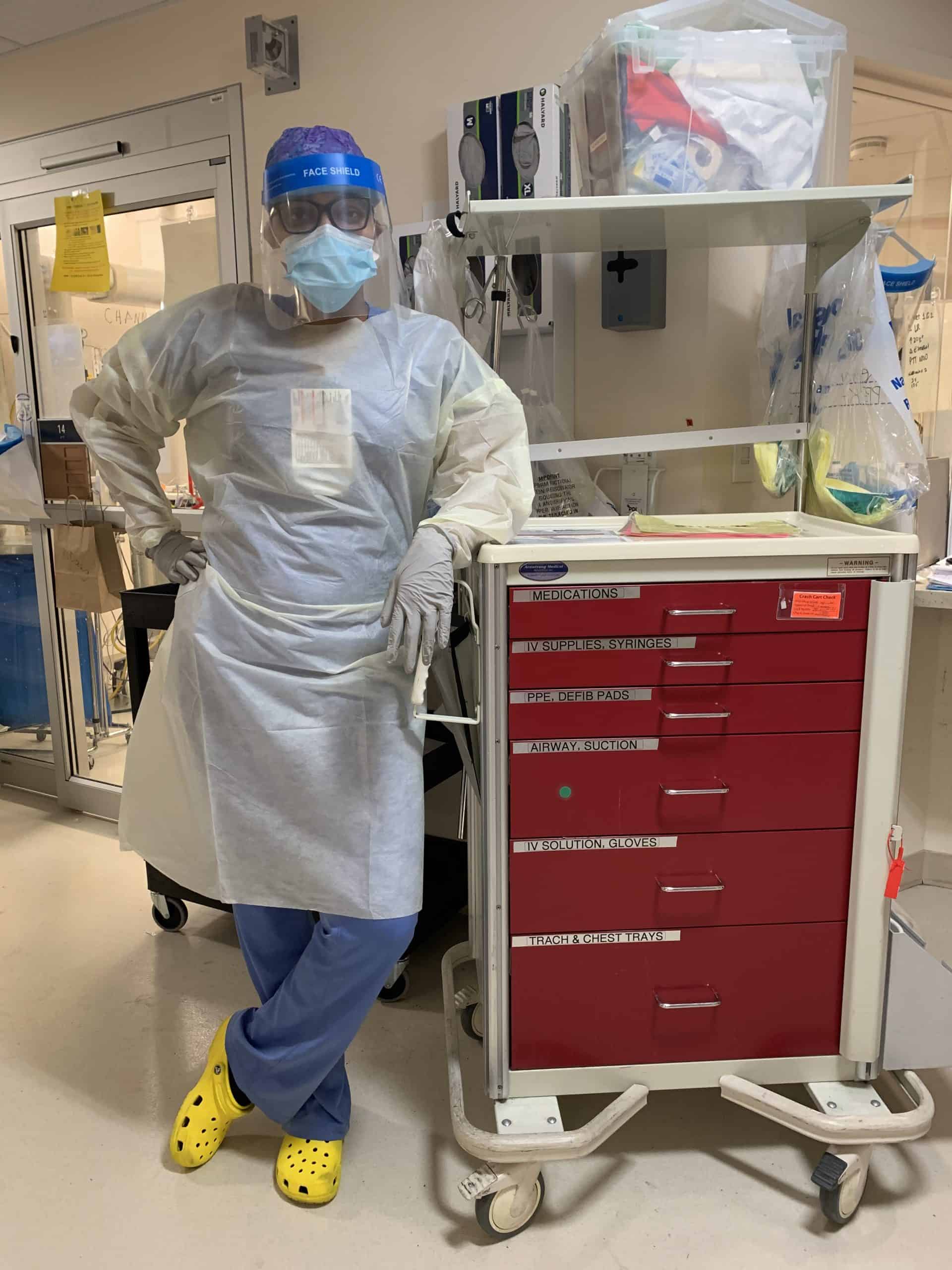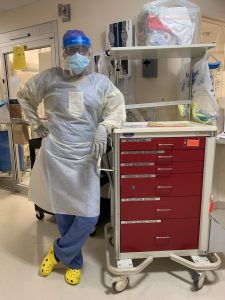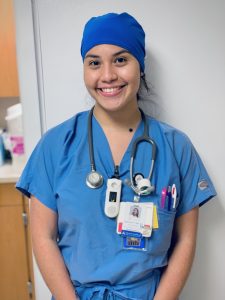
Nursing Graduates on the Front Lines of the Pandemic
STEPHANIE MELVIN, DIRECTOR OF ALUMNAE/I RELATIONS
 Covid-19 is changing the landscape of the world as we know it. Stay-at-home orders, social distancing and work from home routines have provided us with a new normal. How do you handle this new normal if you’re a nurse working with patients with Covid-19? We talked to recent Trinity nursing graduates to learn their perspectives of being on the front lines of the pandemic.
Covid-19 is changing the landscape of the world as we know it. Stay-at-home orders, social distancing and work from home routines have provided us with a new normal. How do you handle this new normal if you’re a nurse working with patients with Covid-19? We talked to recent Trinity nursing graduates to learn their perspectives of being on the front lines of the pandemic.
British Abrams ’19 has always known she wanted to be a nurse. She is an RN working in the cardiovascular intensive care unit at Medstar Washington Hospital Center. She likes working with the heart system because it is a complex organ and affects the rest of the body. “If something goes wrong with the heart, it will have an impact on your body,” says Abrams.
The department where she works has had some Covid patients – especially the sickest. The role of nurses and doctors in the medical ICU is to stabilize the patients but the various treatment options have been trial and error. To help the patients in need, Abrams must gown up in protective gear and is careful to limit interaction with the patients so there won’t be a chance of infection or making the patient worse.
She believes the pandemic will “change nursing policies in the future because as a nurse you will always have the concern whether you will catch it yourself or if you will make a patient sicker.” She wants people to take this seriously because there is still much unknown about this virus.
 Elexis Brown ’19 is an RN in the surgical and medical ICU at Medstar Washington Hospital Center. As a child, Brown looked up to her older cousin who wanted to be a doctor and wanted to follow in her footsteps. As she got older, she saw it was the nurses who take care of the patients and that steered her towards nursing. The bedside manners, hands-on care with patients and comforting family members is what Brown wanted to do.
Elexis Brown ’19 is an RN in the surgical and medical ICU at Medstar Washington Hospital Center. As a child, Brown looked up to her older cousin who wanted to be a doctor and wanted to follow in her footsteps. As she got older, she saw it was the nurses who take care of the patients and that steered her towards nursing. The bedside manners, hands-on care with patients and comforting family members is what Brown wanted to do.
“I think the pandemic has made things a little scary and stressful,” says Brown. She had to adapt to a new norm by dressing in protective gear, disinfecting the nursing station and changing her clothes before going home. “You have to be more cautious in checking on patients and try not to go in and out of their rooms as often.”
Brown says, “People need to take this more seriously because this is serious.” She has seen more deaths because of the virus than other causes in her one year at the hospital. “You need to wash your hands, practice social distancing and stay at home,” she says. “This virus affects everyone. I have friends who are young and they think this won’t affect them – but it can because you don’t know who has it.”
 Stephanie Flores ’19 is a step-down ICU nurse at Shady Grove Hospital. Her unit had to change some areas to accept Covid patients, especially ones with heart issues. She is the first in her family to graduate from high school and go to college. As a child, she remembers seeing a man in blue scrubs and surgical cap and she needed to meet him. She wanted to go beyond the call of duty and make sure that each patient receives the best care with the utmost kindness and compassion.
Stephanie Flores ’19 is a step-down ICU nurse at Shady Grove Hospital. Her unit had to change some areas to accept Covid patients, especially ones with heart issues. She is the first in her family to graduate from high school and go to college. As a child, she remembers seeing a man in blue scrubs and surgical cap and she needed to meet him. She wanted to go beyond the call of duty and make sure that each patient receives the best care with the utmost kindness and compassion.
As a healthcare professional, she never thought she would have to deal with anything like this pandemic. “I didn’t realize how emotionally draining it would be for me as I have only been a nurse for a year,” she says. “I have to make sure I am gowned up and wearing protective gear. It is not easy to bundle our care and limit ourselves from going in and out of the patient’s rooms.” She is usually the one with patients before they die as family members cannot visit with them during this pandemic. Her motto is, “Treat patients like they are my family.”
Flores says, “I don’t feel like I am a hero. I’m doing what I love, what I need to do. We are learning as we’re working on patients with Covid-19. Each week we learn something new. We’re the hero for the patients and their family. Families won’t remember all that went into keeping the patient alive but what happened in their last moments.”
She also wants people to take this pandemic very seriously. “People don’t see what we see in the hospital, so please do your best to protect yourselves.”